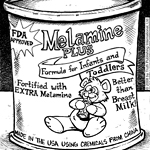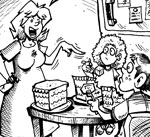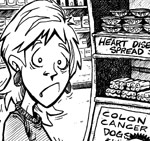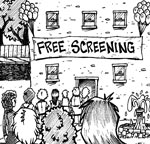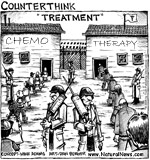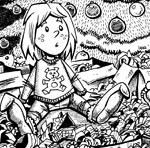Serotonin and Depression - Serotonin's Effects Extend from Head to Toe, But Are Felt First in the Belly
| Share on Facebook | Share on Twitter | Share on Google+ |
Serotonin and mood is a well-known topic, but serotonin and food is a more basic consideration in improving health.
Human beings are not the only creatures that use serotonin in signals from one part of the body to another. Even as simple an animal as a roundworm uses serotonin as a neurotransmitter. When one part of the worm senses its food (bacteria), it releases serotonin to tell the rest of its body to stop looking for food. In a roundworm, the release of dopamine is a chemical that tells the other parts of the worm's body (and also neighboring worms) "Yum! Food!" and the release of serotonin tells the worms muscles, "Here!" The message the worm's primitive nervous system sends when it releases serotonin is that everything is alright, and it's not necessary to keep looking for food.
Serotonin Is An Appetite Inhibitor.
People are of course more complicated than roundworms, but some of the same principles apply. The brain makes serotonin from the amino acid tryptophan. The bloodstream can deliver only small amounts of tryptophan to the brain without the help of insulin. In non-diabetics, the pancreas releases insulin after the individual eats, so serotonin is a strong appetite inhibitor.
The brains of depressed people don't make enough serotonin. They tend to be hungry all the time, like the roundworm looking for its lunch of bacteria. The brains of non-depressed people make enough serotonin. They are not constantly looking for their own lunches to enable their brains to make serotonin.
If you have mild to moderate depression, chances are that one of your most troubling symptoms is appetite. When depressed people overeat to try to get their brains the chemicals needed to fight depression, the resulting weight gain causes even more depression!
And because of the relationship between depleted serotonin and anxiety, the constant message of "not enough" food can be generalized to other aspects of life, causing constant worry that makes dealing with depression all the more difficult. And it also makes eating food to "get it now" even more tempting.
All methods of treating mild to moderate depression involving restoring normal serotonin levels. The problem with over-treating depression, however, is that serotonin levels that are too high can transform depression and anxiety into aggression.
That's why it's often just as effective to treat mild to moderate depression with natural methods, such as 5-HTP and St. John's wort, or with the most natural method of all, talk therapy, with a skilled counselor, minister, or caring friend. If you feel urges to commit suicide, you should seek immediate medical help. But if you are just feeling down in the dumps, then increasing serotonin naturally may be what you need to get back on track to feeling good and living fully.
-
Skin CareMen Skin Care
-
Free ResourcesFree eBooks
-
Health is not a condition of matter, but of Mind.Mary Baker Eddy
-
Featured Health Supplement"...I also suffer from mild-to-moderate depression, so several months ago as an experiment I ordered a few bottles of the Neuro-Natural Serenity formula, but never took it consistently. However, I started taking it faithfully last week at full dose and already my spirits are lifting and I have a greater clarity of mind."
Cathi, USA -

